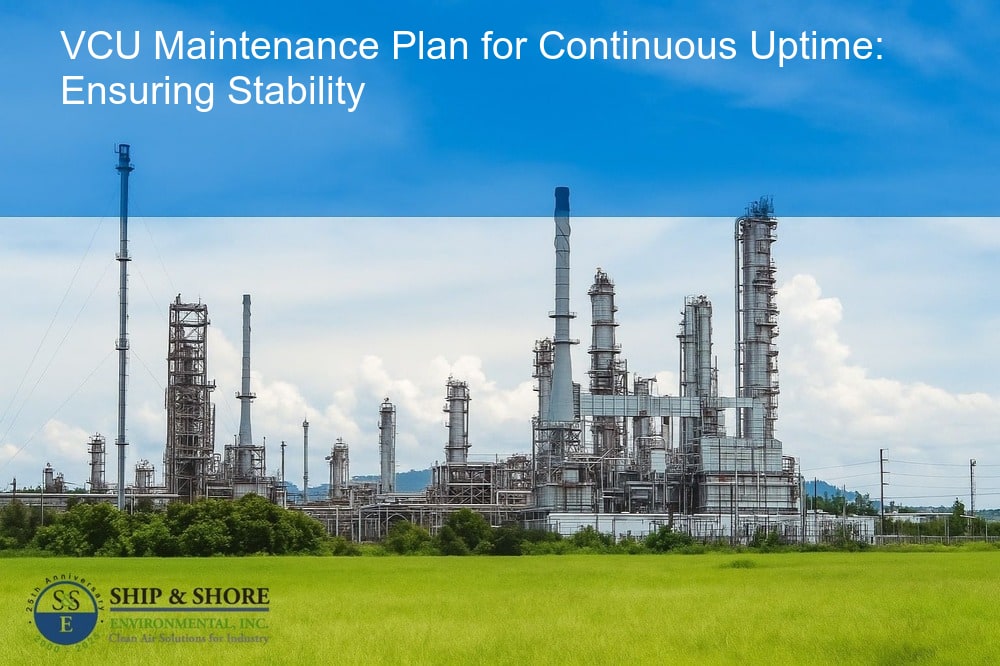
Creating a VCU Maintenance Plan for Continuous Uptime
November 17, 2025 5:18 amUnderstanding the Essence of a VCU Maintenance Plan
At Ship & Shore Environmental, Inc., we recognize the undeniable importance of a well-structured VCU maintenance plan for continuous uptime. A value-critical unit (VCU) serves as an essential component in numerous industrial operations, ensuring that emissions are effectively managed and operational efficiency is maintained. A meticulously designed maintenance plan is the backbone that keeps this pivotal system functioning at its peak, safeguarding against both unexpected downtimes and potential environmental hazards.
The Link between VCU Continuous Uptime and Key Industrial Performance Metrics
Continuous uptime of your VCU is directly linked to several key performance metrics that define industrial success. With our extensive experience, we have seen how unplanned downtimes can severely disrupt production schedules, leading to increased operational costs and potential losses. A robust VCU maintenance plan not only mitigates these risks but also enhances productivity by ensuring that the equipment operates smoothly and efficiently at all times. Efficient operation translates into optimal resource utilization, minimal wastage, and ultimately, higher profitability.
The Critical Role of VCU Maintenance in Reducing Environmental Impact
Environmental stewardship is at the core of our business philosophy. Regular VCU maintenance plays a pivotal role in reducing the environmental footprint of industrial operations. By ensuring that the VCU functions efficiently, harmful emissions are kept in check, adhering to regulatory standards and promoting a cleaner environment. Continuous uptime minimizes the need for emergency repairs, which can often lead to higher emissions due to unplanned operational fluctuations. A solid maintenance plan, therefore, supports sustainable industrial practices by maintaining stringent control over emission levels.
Core Components of an Effective VCU Maintenance Plan for Continuous Uptime
A robust VCU maintenance plan for continuous uptime begins with comprehensive assessments and regular checks. Initially, our engineers conduct a thorough inspection of the Vapor Combustion Unit (VCU) to identify potential failure points. This initial assessment is crucial as it lays the foundation for all future maintenance activities. Furthermore, understanding specific manufacturer’s recommendations and industry standards ensures that our plan aligns with best practices.
The core components of our VCU maintenance plan include:
- Regular Inspections: Scheduled assessments to detect wear and tear.
- Performance Monitoring: Real-time tracking of VCU efficiency metrics.
- Cleaning and Calibration: Ensuring all parts are clean and accurately calibrated.
- Spare Parts Management: Quick replacement of parts to avoid downtime.
- Documentation: Keeping detailed records of maintenance activities and performance trends.
Together, these elements form a comprehensive approach that guarantees long-term operational stability.
How Regular VCU Maintenance Ensures Safety, Efficiency, and Compliance
Firstly, safety is paramount in any industrial operation. By implementing a systematic VCU maintenance plan for continuous uptime, we minimize the risk of accidents and hazardous incidents. Regular check-ups help in identifying and rectifying potentially dangerous conditions before they escalate. As a result, both the workforce and the environment remain protected.
Efficiency is another critical factor. Routine maintenance ensures that our VCU operates at peak performance, thereby optimizing fuel usage and energy consumption. This reduction in operational costs directly impacts our bottom line. Additionally, well-maintained units emit fewer pollutants, making our processes more environmentally friendly.
Compliance, both regulatory and internal, is non-negotiable. Regular maintenance helps keep our equipment within industry standards, thereby avoiding fines and operational halts. In essence, regular VCU maintenance is not merely a best practice but a necessity for sustainable industrial operations.
Case Study: The Impact of a Consistent VCU Maintenance Plan on Real-Life Industrial Operations
In one notable instance, we partnered with a large-scale manufacturing plant that was grappling with frequent VCU downtimes. Initially, they experienced sporadic failures, which eventually escalated into significant operational halts. After collaborating with us and implementing a rigorous VCU maintenance plan, their scenario drastically improved.
Precise monitoring and timely interventions became routine. Consequently, they observed a 25% increase in VCU uptime within the first six months. This improvement wasn’t just in operational hours but also in the overall efficiency of their combustion processes. Moreover, the consistent maintenance reduced their environmental impact, aligning them better with environmental regulations.
The case study highlights the tangible benefits of a dedicated VCU maintenance plan for continuous uptime. By investing in systematic care and timely upkeep, we not only prevent operational disruptions but also enhance our efficiency and compliance.
Did you know? Regular VCU maintenance reduces environmental impact by ensuring the system operates efficiently, which can lead to less energy consumption and lower emissions.
Key Takeaways: The Fundamentals of Sustaining VCU Uptime through Regular Maintenance
The value of a thorough VCU maintenance plan for continuous uptime cannot be overstated. Regular maintenance ensures that vapor combustion units (VCUs) operate at peak efficiency, contributing to overall industrial performance and reliability. By prioritizing routine maintenance, we can significantly reduce the risks of unexpected downtimes, enhance operational safety, and meet stringent environmental standards. The combination of proactive inspections, timely part replacements, and thorough system diagnostics creates a robust foundation for sustained uptime and reliable operation.
The Strategic Role of a VCU Maintenance Plan in Your Long-Term Industrial Strategy
Incorporating a VCU maintenance plan for continuous uptime into our long-term industrial strategy is not just a matter of compliance, but a strategic move to enhance productivity and ensure environmental sustainability. An effective maintenance plan directly correlates with better performance metrics, such as energy efficiency, production outputs, and reduced emissions. By investing in regular maintenance, we take decisive steps towards minimizing our environmental footprint and aligning with regulatory requirements, thus positioning our operations as industry leaders in both performance and sustainability.
Moving Forward with Your VCU Maintenance Plan for Continuous Uptime: Expert Tips and Resources
Adopting a proactive approach to VCU maintenance involves diligent planning and the right set of resources. We recommend establishing a detailed maintenance schedule, incorporating best practices from industry experts, and utilizing advanced diagnostic tools to monitor VCU performance in real-time. Leveraging expert insights can provide valuable guidance for optimizing maintenance routines and addressing potential issues before they escalate. As part of our commitment to excellence, we offer specialized services in vapor combustion that ensure continuous uptime and operational efficiency. Moving forward, prioritizing a structured maintenance plan can yield significant long-term benefits, making it a critical element of our industrial strategy.
FAQ
What are the key benefits of regular VCU maintenance?
Regular VCU maintenance offers a plethora of advantages, including prolonged equipment life, better operational efficiency, and enhanced safety compliance. Additionally, it plays a pivotal role in reducing the environmental impact by ensuring that vapor control systems operate within regulated emissions standards. Consequently, industries can avoid costly downtime and maintain continuous, reliable operations.
How often should a VCU undergo maintenance checks?
The frequency of maintenance checks for a VCU typically depends on the manufacturer’s recommendations and the intensity of its operational demands. Generally, we recommend scheduling periodic inspections at regular intervals to identify and address potential issues early. Leveraging this strategy promotes a consistent performance level and helps preserve the longevity of the equipment.
What core components are included in a VCU maintenance schedule?
An efficient VCU maintenance schedule should encompass a comprehensive inspection of all critical components, such as igniters, pilots, flame arrestors, and burner management systems. It should also include checks for potential corrosion, clogging, and seal integrity. Additionally, reviewing control system calibration and safety mechanisms ensures that the VCU operates securely and meets industry compliance standards.
Can proper VCU maintenance impact energy consumption?
Indeed, by adhering to a diligent maintenance routine, we can significantly enhance the energy efficiency of VCUs. Properly maintained systems often require less energy to operate since they run more smoothly and with optimal combustion efficacy. This translates into lower operating costs and a substantial decrease in energy consumption, reflecting positively on both operational expenses and environmental stewardship.
Where can I find expert guidance on developing a VCU maintenance plan?
Expert guidance on VCU maintenance can be readily accessed through specialized service providers like Ship & Shore Environmental, Inc. We offer tailored support and resources for developing effective maintenance strategies that align with your operational requirements. Our team of experts assists in crafting a plan that not just upholds continuous uptime but also contributes to the longevity and efficiency of your vapor combustion systems.
Categorised in: Blog

